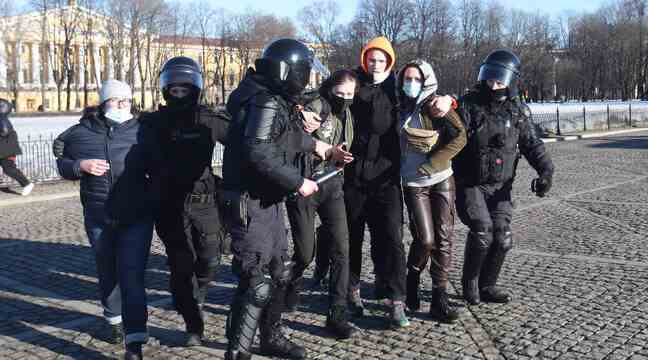In Russia, more than 13,500 demonstrators opposed to the war in Ukraine have been arrested, in total, since February 24, according to the NGO OVD-Info, which specializes in monitoring demonstrations. To deter criticism, authorities last week passed a law cracking down on “misleading information” about Russian military activities in Ukraine. Katia Roux, freedom advocacy officer at Amnesty International, explains the risks faced by people participating in these protest actions.
With the war in Ukraine, do you observe an acceleration of repression in Russia?
Yes. Since the beginning of the invasion, we can see that it is accelerating, with an increasingly repressive arsenal. The crackdown is not new: Russian authorities have been documented for more than fifteen years using increasingly restrictive laws and heavy-handed policing strategies to silence dissent. Their strategy is clear: it’s about undermining the right to protest, pure and simple.
In the context of the war in Ukraine, this strategy takes on a disproportionate scale and we see, since the start of the invasion, an acceleration of the repression against dissenting voices. It happens in the street, online, in newsrooms, in associations. The objective is to silence any dispute.
What do Russians who are arrested in anti-war demonstrations risk?
Those arrested are kept in detention. It has not yet been documented how long they remained there and what their fate was. It is difficult to see the penal or administrative consequences behind it, but we know that the use of fines and detentions is common in the framework of the repression of the right to demonstrate in Russia. It is a very, very cumbersome legislative system.
What we have been able to document in a report published in 2021, it is that often people will be found guilty of undermining the constitutional order, state security, security, social order. They will be sentenced to offences, will no longer be allowed to organize any public gatherings, or will be subject to detention. Since 2011, fines have increased from 2,000 rubles (€54) in 2012 to 300,000 rubles (€3,409). More and more offenses have been added to the assembly laws, with administrative penalties of several weeks in prison.
The new “false news” law can affect anyone, including individuals. Those found to be spreading false information against the Russian military face up to fifteen years in prison (compared to five years under the previous 2019 law if the dissemination of information resulted in bodily harm or the death of individuals). It is extremely heavy. To defy these prohibitions is to expose oneself to heavy fines, administrative detentions, criminal proceedings. Those who are arrested are subjected to unfair trials, parodies of justice, which sometimes last five minutes.
What is the legislative arsenal which makes it possible to condemn the demonstrators?
As early as 2004, there was the Federal Gatherings Act, which restricted when, where, how, for what, and who may or may not take to the streets to demonstrate. In 2014, this arsenal was hardened with a series of amendments launched by federal legislation. This was followed by local authorities adopting new restrictions on the right to demonstrate. These changes emboldened the police and the criminal justice system as officers began to use increasingly brutal strategies to silence protesters. The courts imposed increasingly severe sentences.
For example, at the federal level, the law provides that gatherings cannot take place near a court, a presidential residence, a prison or an emergency department. At the local level, each region has more or less adopted. In the Kirov oblast (nearly 1000 km from Moscow), local legislation prohibits any gathering near cultural, educational, medical establishments, shopping centers, or even public transport stations. In other words, gatherings are almost prohibited everywhere in the city. Between 2012 and 2020, Russian courts tried nearly 34,000 people for violations of the assembly law.
Since December 2020, it is also forbidden for foreign persons, international foreign organizations, as well as Russian nationals and NGOs qualified as foreign agents to finance public gatherings.
There are many other aspects. Spontaneous gatherings, which are unplanned, are prohibited everywhere and are dispersed with excessive force where necessary. The prior notification procedure is, in fact, used by the authorities to restrict the right to demonstrate. The number of participants will be reduced or the gathering will be moved to a sparsely populated area. That’s why we also saw a lot of protests last year by single people with a sign, because it’s one of the ways of protesting that didn’t require prior notification. And who says prior notification says quasi prohibition in reality.
With the war in Ukraine, these laws are used as a tool of repression in a context where the Russian authorities intend to control everything that is going to be said or seen about the current situation. They used every lever to close the channels of communication and prevent the population, journalists, associations from expressing a critical point of view, even if peaceful.

